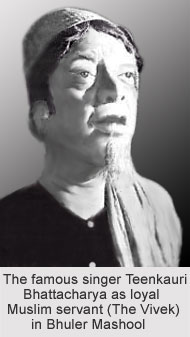 Vivek in Jatra is a popular concept that came into being from the early part of 21st century. As more and more people started to get tired of the juri system, because it continued for long hours, and suspended the theatrical enjoyment. Often public would hiss and boo if the singers over did their long musical performances, hence it slowly went into disrepute.
Vivek in Jatra is a popular concept that came into being from the early part of 21st century. As more and more people started to get tired of the juri system, because it continued for long hours, and suspended the theatrical enjoyment. Often public would hiss and boo if the singers over did their long musical performances, hence it slowly went into disrepute.
It was in 1911 under the instruction of Mathur Shah the juri system was formally disowned without injuring the song sequences. This problem was solved with the introduction of the Vivek. The Vivek, meaning "Conscience", is a character who has the freedom of appearing in any particular scene - in a bed chamber, in a king`s court, in heaven, in hell, in a burning ghat, in a forest, in a street. He enjoys unrestricted freedom. As and when any wrong is done by a particular character, Vivek turns up and warns in a song. If a king is doing wrong, unfair or injustice, the Vivek suddenly appears to check him. Vivek often comes like a madman - his head and feet bare, eyes glazed, beard tangled - he wears a robe of black, saffron, or white. The movements are usually sharp, agile and conclusive. He enters the gangway on the run and disappears in the same way.
A definite and particular dramatic function is imparted to a Vivek. He actually comments on actions through his songs and externalizes the feeling and mind set of the character. He is everyone`s shadow, a running note or commentary on events and actions. He lives in the future, present and past. The role is always played by a highly paid singer. The concept of Vivek was successfully popularized and promoted by a playwright-actor named Ahi Bhushan Bhattacharya.
During the initial days in jatra, when the concept of Vivek was first used, it had freedom and mobility. He is the voice of justice. He sings the conflict in his own mind philosophizes and comments, but he does not really impersonate the Conscience.
The playwright and dramatist can impart the qualities of Vivek only to a noble character who preaches the doctrine of life, its philosophies. This character could also be the brother of a villain, a genuine servant, a monk, a beggar or a guru.
The development of Vivek to concrete, from abstract, narrows down the function of characters, as he can sing out of his own mind, but not the minds of other characters. He also does not induce the other side of human being with the theatrical realty of abstract Vivek.




















